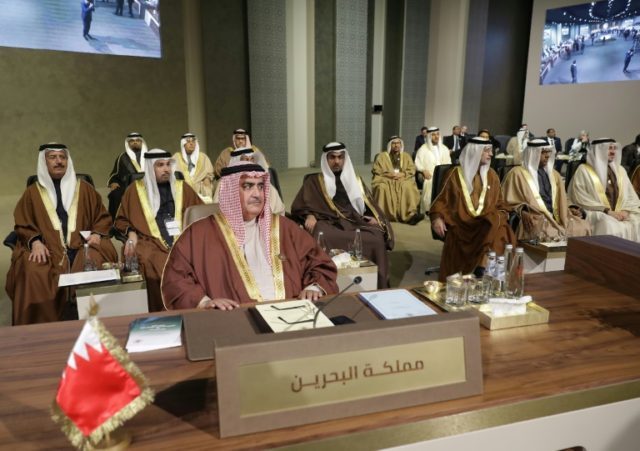TEL AVIV – Bahrain’s foreign minister came under fire from critics in the Arab world who said that his decision to speak to Israeli media constituted “normalization” with Israel, an accusation the top diplomat rejected.
“There are those who say this is normalization. This is not normalization. This is not even a step toward normalization,” Khalid bin Ahmad Al Khalifa told the Saudi-owned Al-Arabiya news channel.
The Bahraini diplomat granted interviews to the Times of Israel and Israel’s Kan public broadcaster on the sidelines of the U.S.-led economic peace conference in Manama. His comments, expressing his hopes for peace and acknowledging Israel’s existence, drew praise from Israelis.
“You must send the correct message to the person you want to address and solve a problem with. That is the Israeli people,” he told Al-Arabiya.
In an interview with Channel 13 last week, Khalifa said that the Palestinians had missed an opportunity by snubbing the conference.
“It is always a mistake to miss an opportunity to achieve peace,” he said. “Yes, this has nothing to do with the [political] peace plan the U.S. will propose. But this was an opportunity that we wanted to see them here, but they chose not to come.”
Addressing the Israeli public, Khalifa said: “You do have peace with Egypt and Jordan, and some kind of understanding with the Palestinians. But this is not the limit of the scope of where you belong. Israel is a country in the Middle East. It is part of the heritage of this region. The Jewish people have a place among us. So communication needs to be a prerequisite for solving all the dispute. We should talk.”
Speaking to the Times of Israel, Khalifa said the economic workshop could be a “gamechanger” in much the same way that former Egyptian president Anwar Sadat’s visit to Jerusalem in 1977 was a precursor to the Camp David Accords and the subsequent peace treaty between Israel and Egypt.
“As much as Camp David 1 was a major gamechanger, after the visit of President Sadat — if this succeeds, and we build on it, and it attracts attention and momentum, this would be the second gamechanger,” Khalifa said.
While he would not commit to endorsing normalized relations with Israel anytime soon, Khalifa emphasized that Manama recognizes Israel’s right to exist, the report said.
“Israel is a country in the region … and it’s there to stay, of course,” he said.
Israel’s foreign ministry lauded his comments and said it would be inviting Bahraini journalists to Israel as a token of its appreciation.
Khalifa has, however, been steadfast in endorsing the Arab Peace Initiative (API). He told Channel 13 that Israel’s rejection of the API is a “missed opportunity,” and urged it to rethink its position.
Kushner last week denounced this notion that the U.S. peace proposal should adhere to the Saudi framework, saying, “if there ever is a deal, it’s not going to be along the lines of the Arab Peace Initiative.”
“Opinions that the Arab Peace Initiative is lacking this thing or that thing have previously been proposed. The Arab Peace Initiative was presented and we did not see any positive welcoming of it, especially from the Israeli side,” he said. “We have not even heard them say: ‘Let us talk about the Arab Peace Initiative.’ Everything we have heard is either silence, rejection, non-acceptance or this is not enough or it is not right.”
The API, initiated by Saudi Arabia, called for a Palestinian state along pre-1967 lines with a capital in eastern Jerusalem and a settlement of the so-called “right of return” for Palestinian “refugees.” The latter has been rejected outright by Israel, which views the return of Palestinians to their ancestral homes in Israel proper as spelling the end of the Jewish state by demographic means.
In return for a full withdrawal from eastern Jerusalem, the Golan Heights and the West Bank, the Arab world would normalize relations with Israel, according to the plan. This would theoretically mean an Israeli withdrawal from the Jewish Quarter of Jerusalem’s Old City, the Western Wall and Temple Mount.
Khalifa urged Israelis to discuss the issues they have with the API with Arab leaders.
“Come and talk to us. Talk to us about it. Say, guys, you have a good initiative, but we have one thing that worries us,” he said.
Addressing the rest of the Trump administration’s peace proposal, Khalifa said he was optimistic.
“We have to wait. I cannot talk about something that I don’t know. But we hope that this political plan will also be attractive to everybody,” he said. “Look at the workshop. It’s very attractive. You don’t want to give an attractive offer and then come and bring something that could stall it. We want to see it continue on the same momentum. So we’ll see it.”

COMMENTS
Please let us know if you're having issues with commenting.